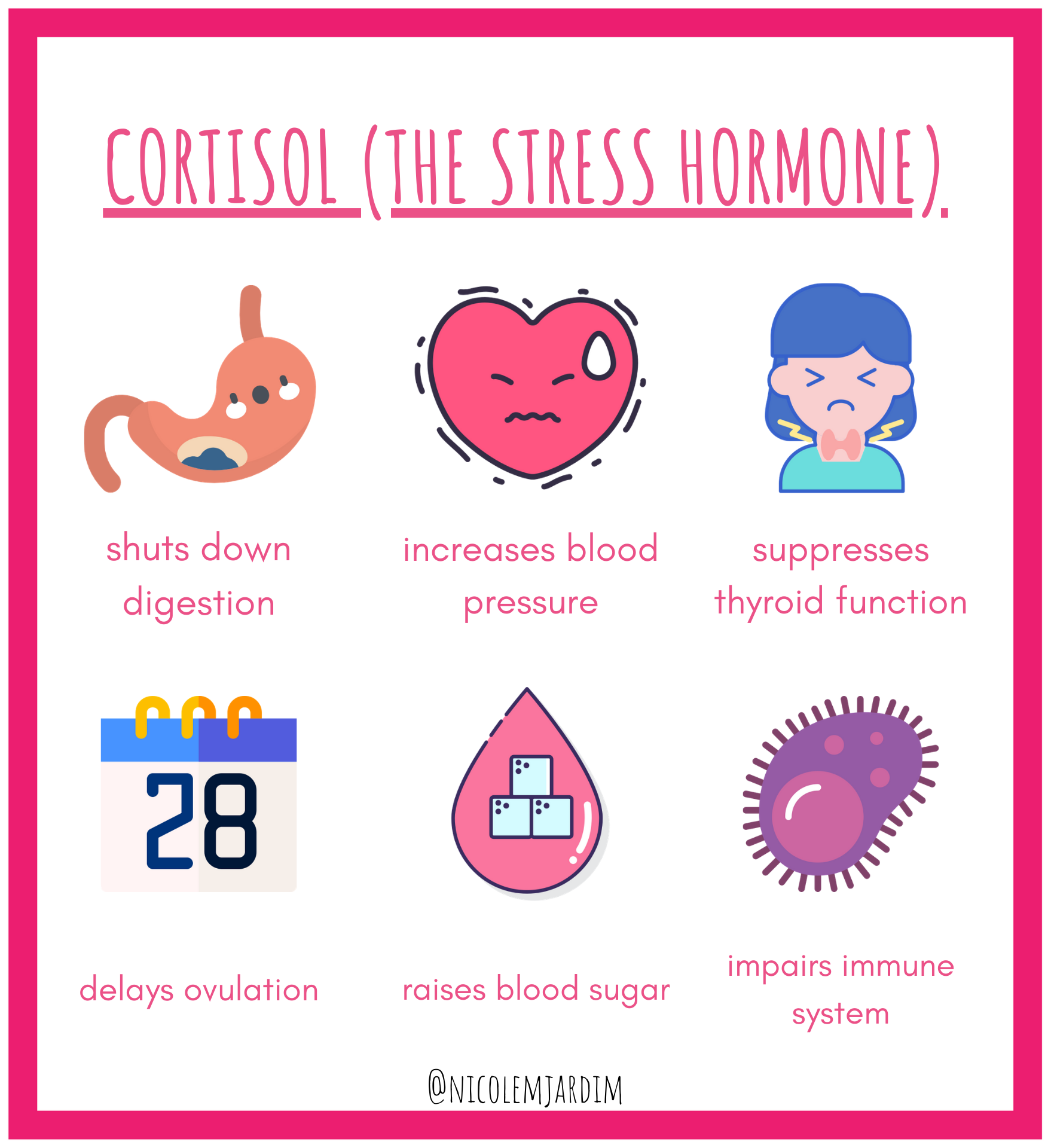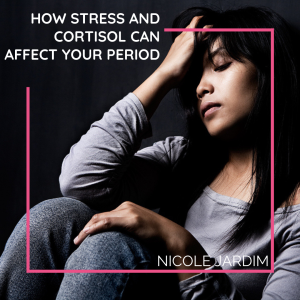Did you know females experience the effects of stress in a much more significant way than males do?
We hear about stress and its deleterious effects all the time. What’s not talked about is the fact that this broadly used term does indeed have a physical effect. And it is most especially apparent in women.
We feel the effects of stress much more than men do and that is because of our hormonal makeup and the fact that we make babies. We’ve plain just got more hormonal action than the dudes.
Check out this article on how stress affects ovulation.
This is a good thing when everything is humming along smoothly, but when it’s not, things deteriorate fast for us ☹️
Cortisol the “Stress Hormone”
The hormone behind most stress-related conditions is cortisol. Cortisol is released by the adrenal glands during times of stress, which is the reason it has been dubbed the “stress hormone.”
The body needs cortisol to power through demanding situations, whether it’s dealing with hectic schedules and difficult bosses or a traumatic life event. Unfortunately, many of us over-produce this hormone due to unrelenting stress in our professional and personal lives.
Some of us are so sensitive that the smallest thing can cause our adrenals to over-produce cortisol…so if you’re not feeling stressed, you might not be off the hook.
How does the human stress response work?
There are two key points about a healthy stress response that need to be emphasized:
- It takes priority over all other metabolic functions in the body
- It wasn’t designed to last very long.
Our ancestors used this response to escape life-threatening situations like running from wooly mammoths! Their adrenals would release cortisol, which would immediately increase their heart rate and blood pressure, release energy stores for immediate use, shut down digestion and other secondary functions, and sharpen their senses.
Thousands of years later, our bodies still respond the same way, except nowadays we’re most likely just sitting in traffic!
In the past there would be acute moments of stress followed by periods of rest but today we are in a constant state of chronic stress with very short periods of rest. Our adrenals are living in the past and have not adapted well to this norm.
Cortisol is great in the short term to help us deal with a perceived threat, but can have a detrimental effect on the body in the long term.

What exactly does Cortisol do?
- It raises blood sugar (to feed muscles so you can run away)
- It raises blood pressure (so you can get out of a threatening situation)
- It lowers immune function (as well as shuts down digestion and reproductive organs – basically any bodily function that isn’t necessary to survive).
As you can imagine, this will inevitably lead to major fallout over time.
Symptoms & conditions associated with dysregulated cortisol:
- Inability to maintain steady energy levels throughout the day – Reliance on carbs/caffeine
- Fatigue and grogginess (lack of energy in the morning, even after a full nights sleep)
- Tired but wired feeling, poor sleep (difficulty winding down or staying asleep
- Unstable blood sugar levels – cortisol and insulin work together, and when cortisol goes up insulin goes up. High insulin causes the ovaries to produce more testosterone. We do not want this! PCOS is the result for many women.
- Brain fog and forgetfulness – ADD, scattered thoughts, inability to focus on a task for long
- Period & fertility problems – your adrenals definitely affect your ovarian function, and impact your fertility
- Weight gain in the mid-section – the dreaded muffin top that keeps getting bigger. This is because belly fat has 4 TIMES more cortisol receptors than any other body fat.
- Low stamina for stress, and easily irritated, high anxiety, panic attacks
- Poor immunity; high incidence of colds and flu; chronic infections (bacterial, viral, yeast)
- Dry, unhealthy skin with excess pigmentation, and/or adult acne
- Lack of libido or no libido – double sad face!
How to to test your Cortisol levels
I’m a huge fan of the DUTCH test (Dried Urine Test for Comprehensive Hormones). They offer multiple tests. I suggest if you’re just wanting to know what is going on with your adrenals that you take the DUTCH Adrenal test. However, getting a complete picture is always ideal, so I mostly recommend the DUTCH Complete to see what is happening with all of your hormones.
You can use code NJC100 for a $100 discount on your test kit. Keep in mind that these tend to be a bit more complicated than normal testing, so you’ll want to work with a practitioner trained in interpreting DUTCH test results.
If this test is not affordable for you, then take a look at other testing companies that offer a Diurnal Cortisol test, which tests cortisol multiple times throughout the day
5 practical steps to start reducing your cortisol levels now:
Reduce your light at night.
Too much light at night actually stimulates your adrenals to produce more cortisol to keep you awake. This prevents you from being able to wind down and sleep properly.
Does the term “tired but wired” sound familiar to you? Here’s what to do. After 9pm turn off as many lights in your house as possible. Do light candles, they make everyone look pretty and they’re sexy too!
Give yourself a laptop curfew, this means no laptops in bed. That bright screen is keeping you up at night. Or get your hands on a pair of sexy blue blocking glasses from Swanwick Sleep!
Practice saying “probably not or no”.
We are programmed to overcommit, over-provide and people please, often at the expense of our own health and adrenal function. Many times we feel resistance to something but do it anyway, in fear of letting someone down.
This week when someone asks you to do something that you know will stress you and your adrenals, practice saying “Probably not…(pause), but let me think about it.” Or just straight up say no. People love us when we say yes to everything so this might ruffle some feathers.
Support yourself nutritionally.
Eat regular meals, especially breakfast, which include high-quality protein, veggies, whole grains and good fats.
Properly timing meals to prevent dramatic dips and spikes in blood sugar minimizes cortisol output and also gives you more sustained energy throughout the day. You goal is to feel full for 4-6 hours after you eat – this is a good indicator that your blood sugar is balanced.
This is the key for addressing a number of hormonal imbalances and the basis of my programs and book.
Supplement wisely.
Many of us take supplements and never see any effect. This is because we are probably not taking the best quality we can get and/or not taking the right targeted amounts.
Most people do best on 3 or 4 supplements at a time, anymore than that and we get overwhelmed and give up. A good B-Complex vitamin is incredibly powerful in addressing a number of hormonal and reproductive issues.
And getting 1000-2000mg of fish oil a day has been shown to lower cortisol levels and reduce inflammation. Rosita Extra Virgin Cod Liver Oil is a great option! Our ovaries are especially vulnerable to inflammation, which is the negative response our bodies have to foods (think sugar, refined carbohydrates etc), psychological stressors and environmental pollutants (also stressors).
Reduce or cut out caffeine and sugar.
I know, I know. This is tough for many people but think of this: both caffeine and sugar stimulate your adrenals to produce cortisol.
In addition, both of these substances do a double whammy on the body by raising not only cortisol but blood sugar levels too. This keeps us on a rollercoaster of blood sugar lows and highs that we can’t seem to escape. That 3pm energy slump? It’s related to imbalanced cortisol and usually we grab something with sugar or we get a coffee to deal with it.
Take baby steps and wean yourself off of these elements slowly. Try Dandy Blend coffee substitute or Foursigmatic Mushroom drinks and use small amounts of honey or maple syrup in place of sugar.
So what else can an uber-stressed out person do!?
You’re in luck because I cover all of this in my book Fix Your Period! In the 6-week program contained in the book I cover the best foods to maintain optimal hormonal health and periods, stress management, blood sugar balancing, gut and liver function, thyroid support, self-care practices, along with hormone testing and so much more!




2 thoughts on “How Stress And Cortisol Can Affect Your Period”
Hi there,
Thanks so much for your post, after reading it I felt relieved that the symptoms I feel are real. Was told that my pituitarty gland is dtysfunctioning. Have an excess of adrenalin and cortisol. So have the large abdomen and face thing going on and cannot seem to sleep at night. The crazy thing is feeling both exhausted and feeling hyped all at the same time, so sometimes because I have two small kids, I eat sugar to get energy only to find out that it doesn’t but makes me feel more stressed. Really appreciate your article! Thanks a million!
You’re so welcome! Your symptoms are definitely real and not often acknowledged by conventional doctors. My book has many more answers. Fixyourperiod.com